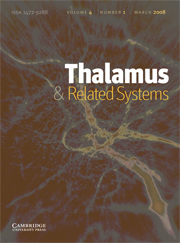Article contents
Neuropsychiatric thalamocortical dysrhythmia: surgical implications
Published online by Cambridge University Press: 18 April 2006
Abstract
Neuropsychiatric surgery has had a long and complex history with examples of less than optimal surgical procedures implemented in wrong settings. Such past errors have raised important philosophical and ethical issues that remain with us for good reasons. However, the existence of enormous suffering due to chronic therapy-resistant disabling neuropsychiatric disorders compels a search for alternative surgical approaches based on a sound understanding of the underlying physiopathological mechanisms. We bring evidence, from single cell physiology and magnetoencephalography, for the existence of a set of neuropsychiatric disorders characterized by localized and protracted low frequency spontaneous recurrent activation of the thalamocortical system. This condition, labeled thalamocortical dysrhythmia, underlies certain chronic psychotic, affective, obsessive compulsive, anxiety and impulse control disorders. Considering the central role of recurrent oscillatory thalamocortical properties in the generation of normal hemispheric functions, we propose a surgical approach that provides a reestablishment of normal thalamocortical oscillations without reduction of cortical tissue and its specific thalamic connectivity. It consists of small strategically placed pallidal and medial thalamic lesions that serve to make subcritical the increased low frequency thalamocortical recurrent network activity. This result is attained via reduction of both thalamic overinhibition and low frequency over-synchronization. Thalamic disinhibition is obtained by a lesion in the anterior medial paralimbic pallidum. The medial thalamic lesion is localized in the posterior part of the central lateral nucleus, where a large majority of cells have been shown to be locked in low frequency production and to have lost their normal activation patterns. We present here our experience with 11 patients, including clinical follow ups and pre- and postsurgical magnetoencephalographic studies. The evidence speaks (1) for a benign and efficient surgical approach, and (2) for the relevance of the patient’s presurgical cognitive and social settings, making them more or less prone to postoperative psychoreactive manifestations upon rekindling of personal goals and social reentry.
Keywords
- Type
- Research Article
- Information
- Copyright
- Elsevier Science Ltd
- 4
- Cited by




